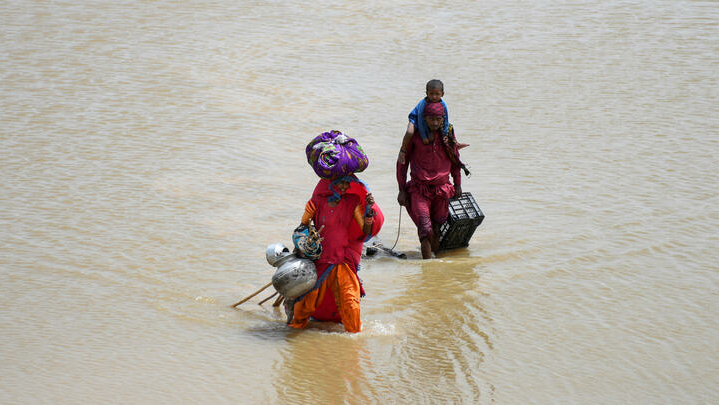SUKKUR, Pakistan (AFP) — Pakistan’s flooded southern Sindh province braced Sunday for a fresh deluge from swollen rivers in the north as the death toll from this year’s monsoon topped 1,000.
The mighty Indus River that courses through Pakistan’s second-most populous region is fed by dozens of mountain tributaries to the north, but many have burst their banks following record rains and glacier melt.
Officials warned torrents of water are expected to reach Sindh in the next few days, adding misery to millions already affected by the floods.
“Right now, Indus is in high flood,” Aziz Soomro, the supervisor of a barrage that regulates the river’s flow near Sukkur, said.
The annual monsoon is essential for irrigating crops and replenishing lakes and dams across the Indian subcontinent, but it also brings destruction.
Officials said this year’s monsoon flooding has affected more than 33 million people — one in seven Pakistanis — destroying or badly damaging nearly a million homes.
On Sunday, the country’s National Disaster Management Authority said the death toll from the monsoon rains had reached 1,033, with 119 killed in the previous 24 hours.
It said this year’s floods are comparable to 2010 — the worst on record — when over 2,000 people died and nearly a fifth of the country was under water.
Thousands of people living near flood-swollen rivers in Pakistan’s north were ordered to evacuate from danger zones, but army helicopters and rescuers are still plucking laggards to safety.
“People were informed around three or four ‘clock in the morning to evacuate their houses,” rescue worker Umar Rafiq told AFP.
“When the flood water hit the area we had to rescue children and women.”
Many rivers in the area — a picturesque tourist destination of rugged mountains and valleys — have burst their banks, demolishing scores of buildings including a 150-room hotel that crumbled into a raging torrent.
Guest house owner Nasir Khan, whose business was badly hit by the 2010 flooding, said he had lost everything.
“It has washed away the remaining part of the hotel,” he told AFP.
Emergency
The government has declared an emergency and mobilized the military to deal with what Climate Change Minister Sherry Rehman has called “a catastrophe of epic scale.”
In parts of Sindh, the only dry land are the elevated roads and rail tracks, alongside which tens of thousands of poor rural folk have taken shelter with their livestock.
Near Sukkur, a row of tents stretched for two kilometers, with people still arriving by boats loaded with wooden charpoy beds and pots and pans — the only possessions they could salvage.
